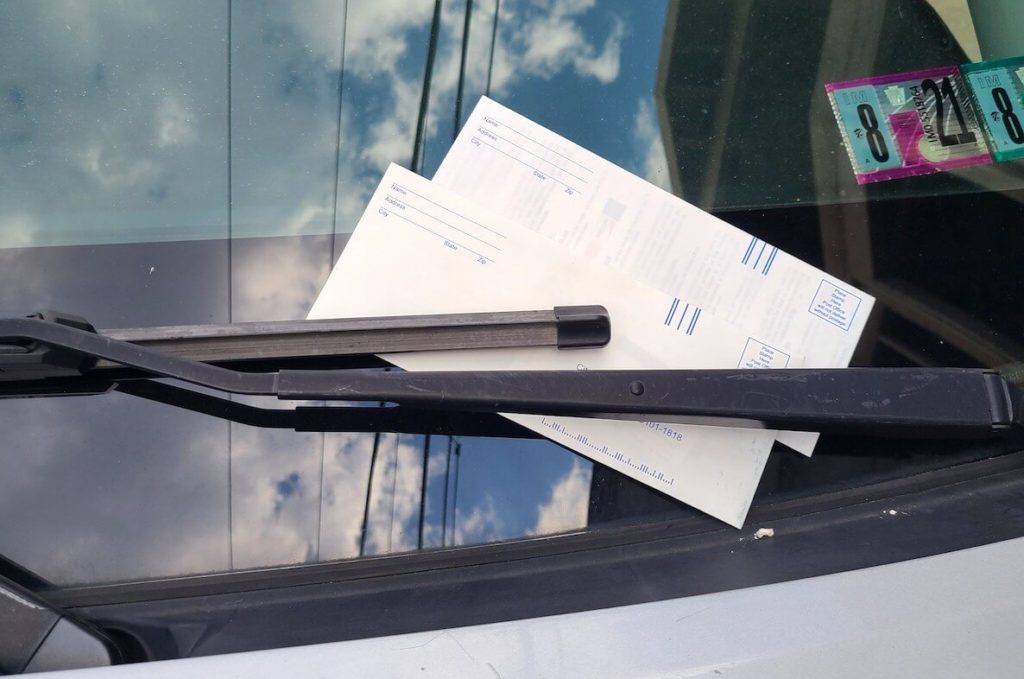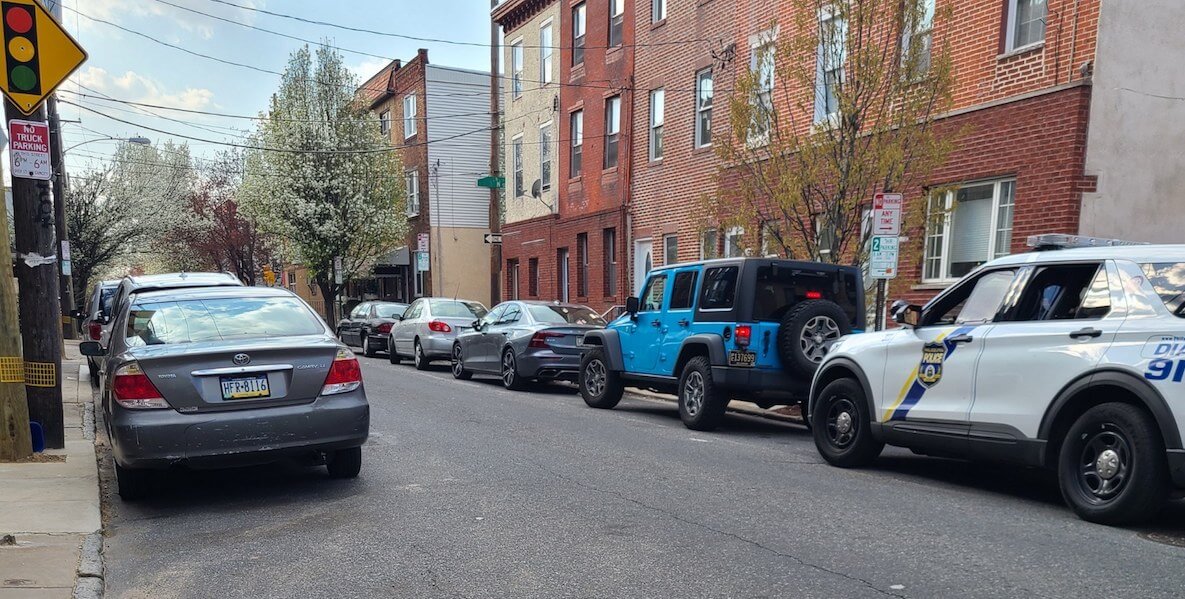On a recent Sunday afternoon, my partner wanted to get out of the city, go to the woods to clear his head. He walked out the front door into the sunshine, only to return 20 minutes later to say his car was gone.
Maybe he’d misremembered where he parked? I’d seen the car about an hour after he’d parked it Friday night (in the spot where he’d just looked, where there was now a red van in its place) so that seemed unlikely. Still, he checked our most frequented spots around the neighborhood. No dice.
Was it stolen? This is a beat up 2008 Toyota Matrix with a broken driver’s side door and no hubcaps we’re talking about. So probably not.
MORE FROM OUR MYSTERY SHOPPING ADVENTURES
-
- What happened when we tried to pay taxes to the Philly Department of Revenue
- We sent mystery shoppers to test Philadelphia City Council and SEPTA
- We tried out some of the City’s various greening services. Here’s where it led us.
- How hard is it to get a pothole filled in your neighborhood? (Hint: very)
I had a hunch it had been “courtesy towed,” our city’s euphemism for the relocation of a legally parked car—for construction, a special event, extreme weather-related circumstances… really any reason—by the City, a private towing company or the Philadelphia Police Department.
The problem is, no one has to notify you that it’s about to be towed, nor tell you where it is once it’s been moved. And from what I’d heard, it could be a huge—and expensive—pain in the butt to track it down.
Well, with every challenge comes opportunity: in this case to write the latest in our Mystery Shopper series, where we secret-shop city services and report back to you. Here, dear Philadelphian, is the ordeal that ensued:
Steps taken to get our car back
1. We go to PPA’s findmytowedcar.org to try to find out if the car has been towed. We type in the license plate and the website spits back: The PPA has no record of the license plate or Vehicle Identification Number you entered.
2. We guess that it hasn’t had time to show up in the system yet, so we call the PPA. “No, we don’t have any record of your vehicle.”
3. My partner hit the bricks, circling the neighborhood while intermittently pressing the panic button on his key fob to see if he could hear a distant toot.
Meanwhile, I pull up this recent Inquirer article about courtesy towing and read about Gary Isaacs, whose car was towed from a legal spot that was made temporarily illegal while he was on vacation. Of courtesy towing, he said to reporter William Bender: “It sounds like a generous thing to do. Except they towed it to a place where it was illegal to park. And then they ticketed it, and impounded it, and put it up for auction.” He had to pay PPA almost $1,000 in fees to get it back before it was sold off—only to find that his driver’s side window had been shattered.
I read about Mary Henin, who was advised to report her courtesy towed car as stolen so the police could help find it, then found it a few blocks from her house and reported it as found. Three months later, just after arriving in South Jersey for a day at the beach with her friend, her Nissan was surrounded by police. Guns pointed, she was ordered to get out of the car and handcuffed immediately. The Philadelphia Police hadn’t updated the car’s status in their system—Henin sat on the curb in handcuffs for nearly an hour while they figured out their mistake.
4. I pray to the South Philly parking gods that our story would not be as bad as these poor souls’.
5. My partner returns—no luck. I suggest we call the police after reading this in the above-mentioned article: In Philadelphia, when the police, PPA, or a private company performs a courtesy tow, it is supposed to relay the new location of each vehicle to police headquarters, so when owners find the car missing and call 911, police can tell them where it is.
He looks incredulous. Call 911? Is that really the process? He insists this isn’t an emergency and calls 311. We get an automated message: The service you are calling is not available from this location. If this is an emergency, please dial 911.
6. Still not an emergency, but alas, we dial 911. Tell them the situation.
PPD: We’ll send someone over.
Us: We think it may have been towed, not stolen…
PPD: I can’t check for you in our system here, so I’ll send someone out and they’ll be able to check from there.
Us (with our hands covering receiver): Weird.
7. I prepare to clear my schedule and wait around the rest of the day, but just about an hour later, Officer Staunton shows up at our front door. The clean-cut policeman wearing a black U.S. Air Force mask asks when we last saw the car, where it was parked, pulls out a pocket-sized red notebook and jots down our answers. (I jot down his on the back of an envelope that, ironically, previously held the Matrix’s Geico insurance plan.)
Officer Staunton: So it was probably courtesy towed.
Us: We figured, but the PPA doesn’t have any record of the car in their system.
Officer Staunton: Yeah, the PPA’s really bad with the records. We report cars stolen all the time and then find them on the PPA lot. Did you already walk the neighborhood and look for it?
Us: Yes.
Officer Staunton: Alright, will you show me where it was parked? Then I’ll drive you around and we’ll see if we can find it.
Us (in our heads): I mean, that’s nice… but really?
8. We lead Staunton to the spot about half a block away. There are no signs alerting drivers of upcoming construction, but I notice a suspiciously new electric pole nearby—the wood looks greenish, fresh, smooth as a baby’s bottom. Staunton says it may have been emergency electrical work that required them to move the car. (I wasn’t so sure. I remembered seeing that very pole lying on the ground—looking staged for erection—earlier that week.)
9. We head to Staunton’s patrol car. “It’s pretty uncomfortable,” he apologizes as we slide into the hard plastic back seat.
He cracks the windows for us and makes a couple phone calls before we head out. First to the 3rd District PPD office, asking if they have a record of the car being relocated. Nope. Then to another on-duty officer in the neighborhood, asking him to keep an eye out for a silver Toyota Matrix. Then to the PPA. He asks for Pat, and once he’s on the line asks him to see if he had a record of said silver Matrix getting relocated on Friday night near 10th and Washington.
Short pause.
“Yep, it’s at 1010 Ellsworth Street,” we hear him say. Sweet relief!
10. Staunton kindly drives us the two whole blocks to the car. There are two $26 tickets on the windshield. “Well that’s bullshit,” Staunton says. He’s on our side. “You should be able to fight these.”
The car is parked on a two-hour metered street, in front of a row home under construction. “This is a private spot!” Staunton says. “You’re lucky you didn’t get towed!” Ha.
11. We drive home feeling pretty lucky. But then, on second thought… really? The City can just move your car, not notify you, nor provide a way to find out where it is, nor have a system in place that will enable you to get it back without paying tickets or fees?
The takeaways

Time (and money) spent: Only about three hours and $52 —which seemed like a sweet deal after the stories I’d read.
Result: Car found! But also, absurdity revealed.
Takeaways: Officer Staunton was nice and really quite helpful, but it did strike us that, perhaps, he could have been doing better things with his time in a city that’s, um, having some troubles.
Other places have at least parts of this figured out better. In Chicago, for instance, you can find the location of your vehicle by searching their online database (Philly only offers this search function for vehicles that were towed not “courtesy towed”), or view a list of all vehicles that have been relocated—and to where they were moved—in the past seven days.
The Philly “system” is essentially: Tow the car wherever; do nothing; wait until they find out it’s missing (which could take days or weeks!) and assume they’ll call the police to report it missing, at which point the PPD should know where it’s been towed, if and only if the PPA provides the PPD with a record (which is a paper log—at no point is there an electronic record of the relocation, according to an officer I spoke with at my District Office). And if they don’t, have an officer—on the clock, mind you—tool around with the driver, looking for the missing car.
Alternatively: Tow the car to an illegal spot; ticket it repeatedly before the driver has a chance to notice it’s missing; impound it; put it up for auction to pay for the “fines.”
Hmm… doesn’t the process for issuing parking tickets—and getting you to pay them—seem so smooth and efficient compared to this?
Lightning bolt rating: 



